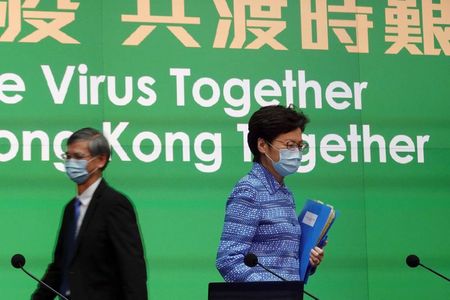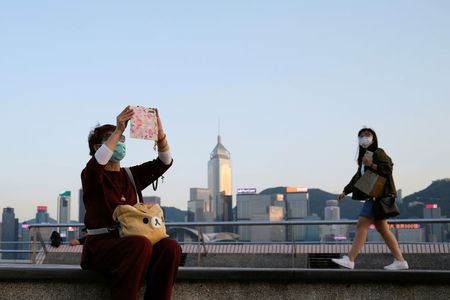By Clare Jim
HONG KONG (Reuters) – Hong Kong’s government will extend restrictions aimed at tackling the coronavirus for another 14 days to preserve the city’s success in keeping the number of cases down, Chief Executive Carrie Lam said on Tuesday.
The extension comes as governments around the world, including those of Australia, Germany and the United States are gradually relaxing restrictions or considering doing so.
The Chinese-ruled city recorded zero new cases on Monday for the first time since early March, keeping the total at 1,025 infections and four deaths.
Hong Kong banned public gatherings of more than four people for 14 days from March 29 and later extended that restriction until April 23. Game centres, gyms, cinemas and other entertainment venues are also closed and foreign arrivals at the airport have been suspended indefinitely.
“This is indeed a very difficult balancing act,” Lam told a regular weekly news conference, referring to the toll the restrictions are taking on the recession-hit economy.
“For the time being, the better balance to be struck and a safer approach to ensure all these successes that Hong Kong has achieved over the last months would not be wasted is to extend these social distancing measures for another 14 days.”
Hong Kong has avoided the exponential infections seen elsewhere and won praise for a strong community response, attributed to the city’s experience with the 2003 Severe Acute Respiratory Syndrome (SARS) epidemic.
Although schools remain closed, many people are working from home and shopping malls and restaurants are less busy. Almost all Hong Kongers wear masks, while office buildings, commercial centres and public institutions run temperature checks and free sanitizer dispensers are widely available.
The residents’ self-discipline also comes amid widespread lack of confidence in the government’s COVID-19 response.
The restrictions extension limits the prospects of a resumption in anti-government demonstrations amid growing anger over a crackdown on pro-democracy forces and as Beijing and city government officials push for national security legislation that critics say would limit freedoms in the city.
Police arrested 15 activists on Saturday, including veteran politicians, a publishing tycoon and senior barristers, in a move criticised by foreign governments, international barristers and rights groups.
Luo Huining, the most senior mainland political official based in Hong Kong, said last week the city should work to introduce national security legislation “as soon as possible” as violent protests last year had undermined its rule of law, prosperity and stability.
Hong Kong returned to Beijing rule in 1997 under a “one country, two systems” formula that guarantees it a high degree of autonomy. A previous attempt to draft a national security law for Hong Kong, known as Article 23, was met with mass protests in 2003 and abandoned.
(Writing by Marius Zaharia; Editing by Shri Navaratnam and Lincoln Feast)



